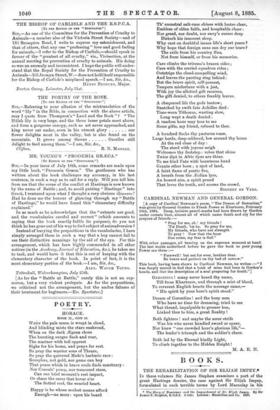MR. YOUNG'S " PROOEMLA. GRJECA."
[TO EDITOR OF TEE "SPECTATOR."]
SIR,—In your issue of July 18th, some remarks are made upon my little book, "Prooemia GrEeca." The gentleman who has written about the book challenges my accuracy, in his last sentence, in such a way as to call for a reply. Will you tell him from me that the scene of the conflict at Hastings is now known by the name of Battle ; and, to avoid putting " Hastings " into Greek, I ventured upon what I thought a very obvious OVIAmpov ? Had he done me the honour of glancing through my "Battle of Hastings," he would have found this "elementary difficulty explained."
In as much as he acknowledges that the "extracts are good, and the vocabularies careful and correct" (which amounts to saying that the book exactly fulfils its purpose), do you not think he has gone out of his way to find subject of animadversion?
Instead of burying the prepositions in the vocabularies, I have simply arranged them in such a way that a boy cannot fail to see their distinctive meanings by the aid of the eye. For this arrangement, which has been highly commended in all other notices (in the Academy, Journal of Education, &c.), he takes me to task, and would have it that this is out of keeping with the elementary character of the book. In point of fact, it is the most elementary portion of the book.—I am, Sir, &c., [As for the "Battle at Battle," surely this is not an oxy- moron, but a very violent prolepsis. As for the prepositions, we criticised not the arrangement, but the undue fnlness of their treatment for beginners.—En. Spectator.]


































 Previous page
Previous page